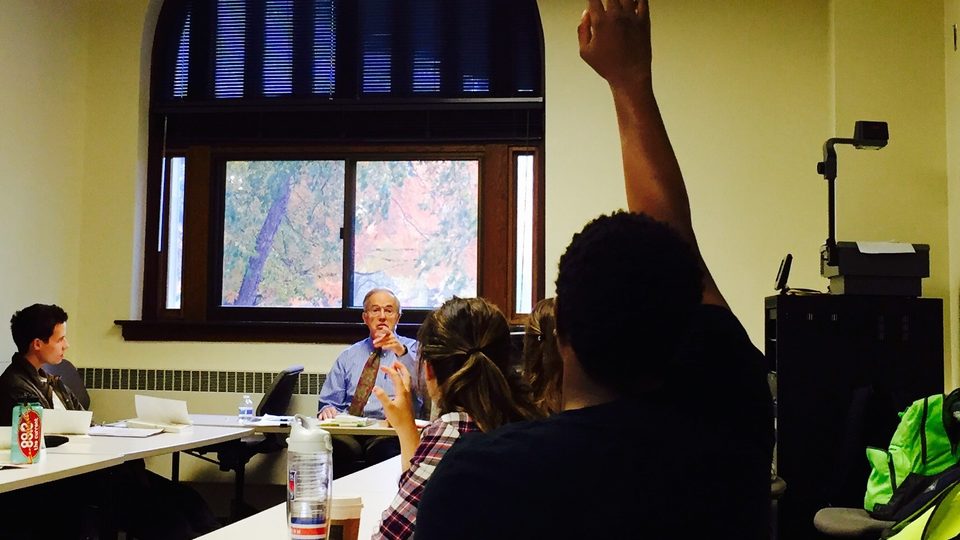Argument and Inquiry seminars show freshmen the academic ropes
What is a liberal arts education? Most, if not all, first-year students would likely struggle to explain the concept before stepping into a Carleton classroom. That’s why Argument and Inquiry seminars help establish expectations.

“In high school, you focus on the format and the form. Here, we want you to dance.”
It was meant to answer a student’s question about how to write a paper for her fall Growing Up Cross-Culturally class. But French professor Stephanie Cox’s response could have easily served as a thesis statement for freshman Argument and Inquiry seminars—and by extension, Carleton’s liberal arts ethos.
During one of Cox’s classes in October, 14 students split into smaller groups to discuss American Born Chinese, a graphic novel by Gene Luen Yang. The book tracks three narratives that converge on the plight of an Asian American teenager who longs for acceptance from his white classmates.
At first glance, the pages seem innocent, perhaps even better suited for a grade school audience. Except Yang’s colorful comic book-style illustrations are dotted with ugly Asian caricatures and stereotypes that critique cultural identity and the way it has been shaped historically.
Not exactly kids’ stuff.
After five minutes of private discussion, two assigned student leaders bring the full group back together. They debate the protagonist’s demonstration of “tough love” with a new Asian classmate who doesn’t speak English. Self-loathing pops up as a recurring theme as the group is asked to think about times when they didn’t fit in or made a deliberate attempt to hide their cultural identity out of embarrassment.
The discussion is often polite and tentative, skirting on the edge of tough questions Yang proposes about cultural acceptance and idealism. Then again, Cox isn’t seeking perfect solutions in this class. Instead, she simply wants Carleton newcomers to “interact with the big questions.”
She wants them to dance.
OPENING STUDENT MINDS
When Argument and Inquiry seminars were added to Carleton’s new graduation requirements in 2009, the intent was to get freshmen acquainted with the college transition—both socially and intellectually—in a common academic space, says associate dean Louis Newman.
Colleges like Carleton long held small seminars for first-year students. They just weren’t required.
Now, all freshmen take one A&I seminar of their choice during fall term. Thirty-seven classes are offered this year, with topics ranging from Autobiography (English) and The Ethics of Being a Family (philosophy) to Re-Imagining God (religion), Explorations of Geometry (math), and How We Make Important Decisions (cognitive science). A September convocation devoted to A&I further introduces freshmen to liberal arts expectations and what it means for the next four years—more discussion, more writing, more interdisciplinary learning.
“If you ask, ‘What is a liberal arts education?’ to the average incoming student, I’m willing to bet that most wouldn’t be able to give a coherent answer,” Newman says. “So, the goal is to get them oriented to what kind of education this is. What does it mean to walk out of a geology class into a history class into a sociology class into an art class? It might be different disciplines that you’re dealing with, but the vast majority of students have never thought about what a discipline actually is. Or how you ask different questions in each, or use different data, or analyze the text differently. A&I, really, is meant to open students’ minds.”
A DIFFERENT STANDARD
Embracing the backstory—wherever it may lead—stokes enthusiasm in history professor Clifford Clark’s Drunks and Teetotalers: Alcohol and American Society seminar. During a late October morning, students are supposed to be discussing the evolving image of the alcoholic throughout history. But they appear more eager to talk about the enforcement ethics of drinking policies on college campuses.
When nearby St. Olaf is cited as an example of a dry campus, there’s confusion about what it means for both private and public enforcement. Clark eventually pulls the class back to the assigned readings, but not before letting them ruminate on a topic that clearly hits close to home—in this case, the dorm floor they’re sharing with relative strangers.
“This is not a course to teach a lesson or find the moral,” Clark says. “It is, however, a course designed to raise awareness of a range of problems, from addiction to the problems of alcohol use to sexual consent, which is really intertwined on college campuses.”
For the retiring Clark, teaching Carleton newcomers in his final term as a professor has been a blessing. He enjoys A&I because it’s a chance to tailor a history class with personal relevance to first-year students.
“They’ve entered a new culture here. They’re trying to fit in, find their place,” Clark says.
“I never had anything like this when I went to college. It was simply, ‘All right, you’re off. That’s it! Figure it out!”
Cox sees an adjustment period for once-proud academic all-stars, as well.
Professors are intentional about using freshman seminars to introduce the new reality at Carleton. Students who aced all of their writing assignments in high school learn quickly that there’s a different quality standard for papers. Clark’s class, for example, requires a paper every other week, plus one of those papers to be re-written. Those more inclined to sit quietly in class and avoid active discussions also can’t hide in a room of 15. As Cox notes, “You’re part of the learning of your classmate. If you’re not prepared, then it’s all taken down a notch.”
“Obviously these students saw something in Carleton and it’s why they came here. But it might take awhile for them to figure out what the standard we’re looking for is, and yes, it’s also going to take a lot of hard work to get to it,” Cox says. “But that’s the job of the A&I seminar, to clear that up.”